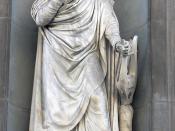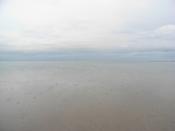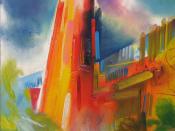In A Portrait of an Artist as a Young Man, the struggle to undermine all types of authority is paramount. Stephen Dedalus embodies the struggle of conformity, sin, and identity, which must of western European society from the middle of the nineteenth century, struggled with. However, the Catholic Church remained to be a potent force in Joyce's native Ireland through and beyond the nineteenth century. The Church was not only influential in terms of spiritual guidance but it also influenced family life, politics and education. Stephen is confronted with all types of authority and swings from being free to being under such orders. Although Stephen ebbs and flows between received authority, he ultimately is destined to become an individual. It is through becoming an artist that he breaks the ties of his past, religion and family and is free from the "nets" of Irish society.
Nietzsche influenced Joyce, both by the idea of the individual instead of the mindless "herd" and his criticism of religion.
Known for coining the phrase, "God is Dead", Nietzsche suggested that morality was imposed in order to consolidate power and that belief in objective morality was no more than a reaction to gain strength from the instinct of the herd (Childs 55). Nietzsche further suggests in his Essay in Self-Critics that the pursuit of mankind, in terms of metaphysical activity, should not be in morality but rather art due to the world being perceived as an "aesthetic phenomenon" (55). When moral, philosophical, political, and social systems are externally imposed, then, according to Nietzsche, it is up to the artist to stand out as an individual. Joyce, in 1984, had renounced Catholicism: "I found it impossible for me to remain in it on account of the impulses of my nature", but also objected to the interference...


